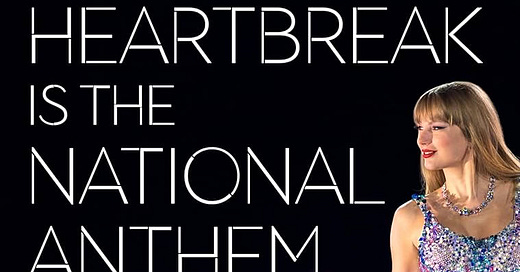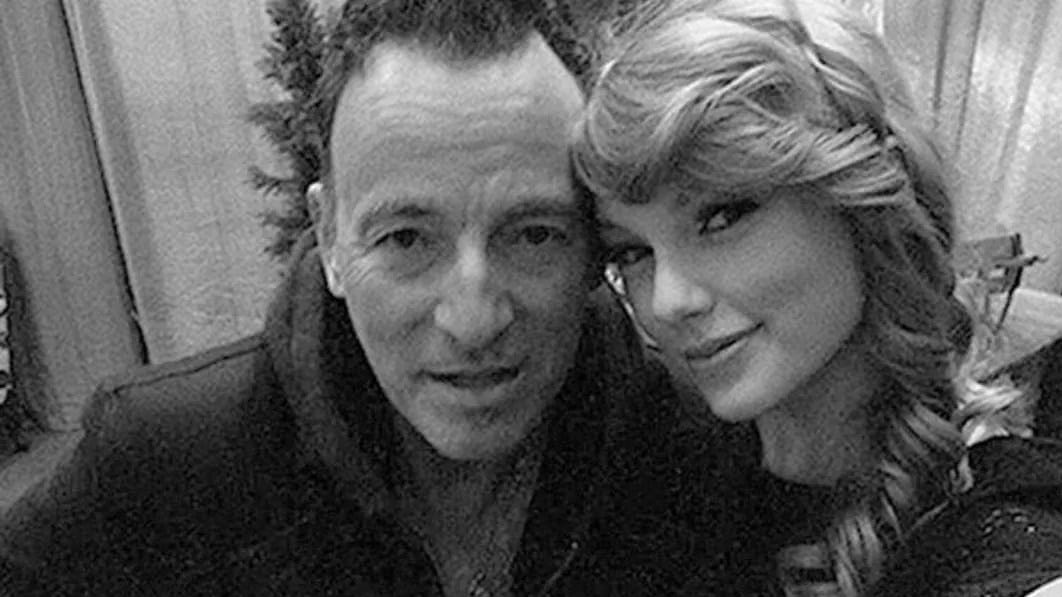Review: Heartbreak is a National Anthem
My thoughts on Rob Sheffield's great new book and letting it be known that, yes, I am a Swiftie.
I really think we’re living in a great time for music criticism. I think about some of the great podcasts like Yasi Salek’s Bandsplain, Rob Harvilla’s 60 Songs that Explain the 90s, and even Jokermen (though I find them frustrating at times). There are also some great writers working right now: Steven Hyden, Brian Hiatt, Josh Terry, Caryn Rose, Stephen Thomas Erlewine, just to name a very few (in addition to the major figures like Greil Marcus and Robert Christgau who are still out there).
Something I like about so many of these voices is that they’re omnivorous. What do I mean by that? Well, they like and appreciate a wide range of music. They aren’t as hamstrung by being locked into just one genre or really enjoying one type of music. They’re rockists, but also poptimists at the same time. So many of the divides and divisions… we just don’t care about anymore. You can admit to enjoying things that might have been considered uncool in the past.
This leads me to one writer I haven’t mentioned—Rob Sheffield. Sheffield, a prolific author (writing some excellent and moving memoirs) has published a new book titled Heartbreak is a National Anthem: How Taylor Swift Reinvented Pop Music. In this book, Sheffield takes a look at the superstar, thinking about her antecedents as well as how she’s impacted the landscape of popular music and culture.
The premise of the book as described on the back cover:
A cultural phenomenon. A worldwide obsession. An agent of emotional chaos. There’s no parallel to Taylor Swift in history: a teenage girl who turns into the world’s favorite pop star, songwriter, storyteller, guitar hero, live performer, changing how music is made and heard. An all-time great on the level of The Beatles, Prince, or David Bowie.
Sheffield, who writes for Rolling Stone, writes as someone who genuinely appreciates Swift’s art. He takes her seriously, which is the best thing he could do. I didn’t want to read something by a disengaged critic looking at the Taylor Swift phenomenon with a kind of detached bemusement or cynicism. I wanted to read someone who took her seriously, who took her craft and her work seriously, and appreciates what she does. Sheffield does this. Sheffield writes about Swift’s songs in a way that makes you want to put them on right after you finish reading. His chapter on “All Too Well,” excerpted here in Rolling Stone, put that song in heavy rotation for me. It’s a book that the biggest of Swiftie can enjoy, but will also appeal to someone who doesn’t really know that much about Taylor Swift beyond her biggest songs.
But what I was especially interested in thinking about Swift in the long history of popular music. While many tend to react to the next big/important thing as though there’s never been anything like it, most of us who are attuned to the world of popular music know that these things happen in a continuum. Sheffield highlights a few artists who connect to Swift and explain something about her and her importance.
One of these artists is Paul McCartney, as he was someone who was a part of a group that both had enormous popularity while also creating something of quality and has a gift for writing incredibly catchy and memorable pop songs. Sheffield, who wrote a book about the Beatles, rightly points out that the Beatles really showed what you can do when you have the young girl/young women in your corner.
Sheffield also brings up Stevie Nicks, whom Swift (in)famously had a (forgettable) duet with at the 2010 Grammys. There are certainly elements of her persona in Swift, and I think it’s hard to not think of Stevie Nicks when you have a blond haired star singer in touch with the folk/rock/pop tradition. This can also apply to Joni Mitchell and Carole King, but I think Nicks is the biggest one.
Finally, and obviously most relevant to me, was connecting Swift to my favorite artist of all-time, Mr. Bruce Springsteen. I certainly think there’s a connection there—they both write anthemic pop/rock songs that sound great performed in arenas and stadiums with crowds of fans singing along. Though their sounds are different (to some degree, in other ways there’s some overlap), both Springsteen and Swift share that anthemic quality and show the kind of emotional resonance that can be created with a great pop/rock song.
Thinking about Swift in conjunction with Springsteen… this leads me to something that I just need to own. You know what? I’m a Taylor Swift fan. I guess you could call me a Swiftie. Beyond the fact that she writes and performs (I know it makes me sound like that cranky guy, but that she’s writing and playing guitar is a big thing in my mind) songs that are insanely catchy and well-written (turns of phrase, narratives), I love that Swift is like Springsteen in that she writes these big songs (in terms of scope and reach) that can be so moving for so many people.
The way I hear the Taylor Swift fans I know talk about her music makes me think about how I talk about Springsteen. Listening to her songs, I can see that’s not a coincidence. I also do like that she’s this figure for so many young women to turn to and look up to in much the same way that many men (like myself) turned to Springsteen as this kind of model. And just like how there are plenty of women who show that Springsteen’s appeal isn’t just to men (I mean, this is what Caryn Rose is doing with her work), perhaps I need to be an example of a guy who gets and appreciates what Taylor Swift does (just like Rob Sheffield does).
It’s not the coolest or most unique stand to take, and it probably ruins whatever cool credibility I have in some of your eyes, but I’m placing my lot with the Swifties and letting it be known I appreciate and enjoy what Taylor Swift does. Heartbreak is the National Anthem made me realize this and want to dig deeper (I’d mainly listened to Swift’s post-1989 stuff, but now I’ve been going back to Red). You know a book is good when it makes you want to learn more about its subject, and to keep digging into whatever that subject is. Sheffield, in Heartbreak, has done that for me and made realize and readily acknowledge my appreciation for what Taylor Swift has done and can do.
So, fair warning, this means as some point I’ll have to do a Taylor Swift countdown of some kind. But for now, I’m just leaving it at you should read Rob Sheffield’s new book.






